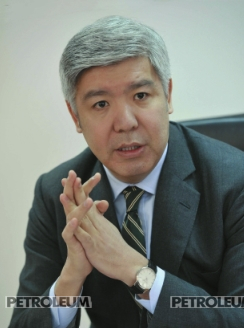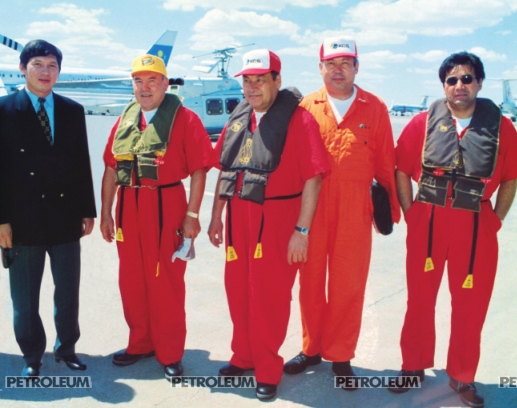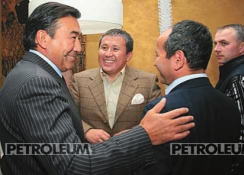Retrospective
Black Gold of Independence
Oleg Chervinskiy, Editor-in-Chief of Petroleum MagazinePetroleum Magazine and Ratel analytical internet website on the eve of the 25 anniversary of Independence produced a special series of publications under the general heading Black Gold of Independence. We offer our readers remember how and in what circumstances arose and found feet of the oil and gas industry of independent Kazakhstan. Full cycle can be read on the website www.ratel.kz
(Continuation. See the beginning in the issue #6-2016)
Year of 1998. “Enough!”, said Tractebel to Nurlan Balgimbayev
No Money-No Gas
The country starts new 1998 year with a big gas deficit. For whole December of 1997 the residents of Almaty suffered from lack of gas supplies. A new owner of gas networks does not fulfil the expectations of the Government and comes in for increasing criticism. However, the situation is not surprising, because the gas facilities were transferred to the Tractebel concession in spite of the objection of Nurlan BALGIMBAYEV, Minister of oil and gas, and now the head of the Cabinet of Ministers. Yury KHITRIN, the Prosecutor General, declares about the breach of legislation when concluding the concession contract, however, without giving any details. The Governmental Regulation “ For protection of the state interests in the concession contract of the Kazakhstan’s gas transportation system” stipulates the creation of an inter-ministerial commission, assigned with "preparation of detailed opinion on the concession contract compliance with the Kazakhstani legislation, and protection of the state interests in the Contract, upon recommendation of General Prosecutor Office and the Supreme Court," within the period of three months.
In reply to this pressure, Tractebel company publishes an article with “Enough!” headline in the business print media for publicity purposes. The concessionaire explains that the absence of gas in Almaty is caused by non-payment of Almatygorgas for already delivered fuel and declares that Mr. Balgimbayev, as a former head of Kazakhoil, and ex-Minister of oil and gas, "should take a major part of responsibility for financial failures and bankruptcy of the gas system and its enterprises before their transferring to the concession". After intervention of the President, the resonant public conflict will be reduced to cabinet discussions, and two years later, it will finish with the exit of the Belgian company from the Kazakhstan market.
Jean-Pierre Hansen, Executive Director of Tractebel company, later precised that Kazakhstan is "extremely tough country for doing business". Nicholas Aterinos, Senior Vice President, who once persuaded the shareholders in the profitability of investing to Kazakhstan, and, presumably a person, who took the decision to pay 50 million commission to three businessmen, having the Belgium residence permit and having connections to the Kazakhstani authorities for the right to work in the country, was dismissed from the company.
Dreams Of Second Kuwait Failed Due To Crisis
On April 2, Nursultan NAZARBAYEV said during the press briefing in Astana: "Fortunately, Kazakhstan is not yet strongly dependent on the global oil and gas prices”, and therefore, the fall in hydrocarbons prices will not harm the country’s economy. However, the prices are falling faster than expected: during two months the oil turns for 30% at once. This is the first serious test for Kazakhstan after the chaos of the Soviet Union collapse, and it catches the government on the back foot: a half year ago it seemed that the perspectives of "big oil" will transform the country into a second Kuwait. However, the collapse of Asian and then Russian markets coincide with the peak of payments under the foreign loans, borrowed during the first years of independence.
By the summer the situation becomes so much worse, that Nurlan BALGIMBAYEV, the Prime Minister and oilman, is forced to sign the Governmental Regulation No. 697 "On urgent measures for stabilization of the financial and economic situation in the petroleum industry of the Republic of Kazakhstan». The ministries, departments and national companies are instructed to reduce the net costs of oil production and refining, as well as the transportation tariffs. Kazakhoil NOC is ordered to eliminate the intermediary structures and to take measures to ensure “unconditional return of diverted funds of the enterprises”.
The Ministry of Finance shall conduct the analysis of loan payable to the Government of industry players, formed in previous years due to the directorial supply, and to make proposals on its restructuring and write-off. "In order to eliminate the salaries payable of industry players, it is necessary to establish an order in usage of money, arriving in the bank accounts of such enterprises, which is provided allocation of 60 per cent of the money for salaries, and the remaining 40 per cent - for compulsory payments".
 Nurlan Kapparov, President of KazakhOil
Nurlan Kapparov, President of KazakhOilYoung Turkomen Come To Power
The national oil and gas company management is changed on the backdrop of a full-scale economic crisis. The Head of State dismisses Baltabek KUANDYKOV, the President of Kazakhoil. He is under an accusation of export deliveries decline and POL price increase, under the conditions of international oil prices decline. Much later, foe example, continuous petrol price increase, in the face of crude oil prices decline, does not surprise anyone.
27-year Nurlan KAPPAROV, a businessman, the Head of the successful Accept holding and, prior to that the Head of KazTransOil, takes the place of professional oilman. After his accession to the office, among rigid workers, people of such “exotic” occupations as a stylists or an image-makers, can be seen in the Kazakhoil corridors.
A young businessman Erlan UPUSHEV is appointed to the position of the Head of KazTransOil. Another young Turkoman, Mukhtar ABLYAZOV, who later will join to the irreconcilable opposition to the president, is appointed to the post of Minister of Energy, Industry and Trade.
TCO Looks Towards China
While the process of coordination of financial and tax issues in the Caspian Pipeline Consortium is in progress, Tengizchevroil paves the way towards China. On January 10, the first railroad train with Tengiz oil for the Celestial Empire is loaded in Atyrau. A trial batch of 3.5 thousand tons must pass the process of experimental refining at the factories of Xinjiang and Uygur Autonomous Region. By that time, the railroad trains already delivering Tengiz oil to Finland, as well as to the Black Sea and the Baltic terminals. China expresses willingness to become another major consumer of Tengiz oil.
Caspian Sea Is Shared For Two
On March 23, the official presentation of the established, in accordance with North Caspian Production Sharing Agreement, Offshore Kazakhstan International Operating Company (OKIOC) Consortium, takes place in Almaty. The company announces that drilling process of the first well in the Caspian Sea region will begin before the end of the year. In accordance with PSA, signed in the United States in November 1997, the minimum obligation of OKIOC is the drilling of six wells, after which the conclusion on the prospect of deposits and reserves of oil and gas will be made. Shell company becomes the Consortium Operator, and accordingly, its headquarters located in the Hague, next to the head office of the Shell.
To legitimize the exploration operations in the North Caspian Sea region, Kazakhstan and Russia sign an Agreement on the delimitation of the seabed in the northern part of the Caspian Sea at the summit level, in order to effectuate sovereign rights for subsoil use. It is symbolic that signing of the agreement is dated to the birthday of Nursultan NAZARBAYEV. Two countries, without waiting for the rest of the Caspian neighbours, have agreed to divide the northern part of the Caspian seabed by a modified median line. Nevertheless, Azerbaijan continues to insist on the fact, that the Caspian is a lake, and proposes to divide its water area, seabed and mineral resources into national sectors, the boundary line of which will be presented as State borders.
 The visit of the President to the Caspian Sea offshore area. From left to right: Director General of the KCS Consortium Zhakyp Marabayev, President Nursultan Nazarbayev, Akim of Atyrau region Ravil Cherdabayev, President of the National Company Kazakhstancaspishelf Baltabek Kuandykov, Minister of Oil and Gas Nurlan Balgimbayev.
The visit of the President to the Caspian Sea offshore area. From left to right: Director General of the KCS Consortium Zhakyp Marabayev, President Nursultan Nazarbayev, Akim of Atyrau region Ravil Cherdabayev, President of the National Company Kazakhstancaspishelf Baltabek Kuandykov, Minister of Oil and Gas Nurlan Balgimbayev.
 From left to right: Prime Minister of Kazakhstan Nurlan Balgimbayev, President of Food Contract Corporation Nurlan Smagulov and Minister of Energy, Industry and Trade Mukhtar Ablyazov
From left to right: Prime Minister of Kazakhstan Nurlan Balgimbayev, President of Food Contract Corporation Nurlan Smagulov and Minister of Energy, Industry and Trade Mukhtar AblyazovHow To Sell Future Oil?
By the autumn, economic situation becomes critical, despite all the efforts, undertaken by the Government. The budget is empty, and there is an urgent need to seek sources of its replenishment. Seemingly there is nothing to sell, because virtually, all producing and refining capacities are privately owned. If the remaining part of mining assets is privatized, the President of Kazakhoil will lead only the Office and official cars. But the problem is solved - we can sell future oil! The Government takes a decision on selling 1/7 of participation share in the international OKIOC Consortium, whose owner was a State company Kazakhstancaspishelf, to the Consortium of Japanese companies and the American Phillips Petroleum, for 600 million USD.
Agreements, signed at the same date, are intended to make the pot sweeter: Japanese companies Marubeni, Mitsui and Mitsubishi took the obligation on reconstruction of the Atyrau Oil Refinery, and construction of a new petrochemical plastics production plant, construction of a major drilling equipment manufacture, as well as on construction of an aluminium plant in Pavlodar. As announced, four projects involve 2 billion dollars of direct investment. Phillips Petroleum, on the sidelines of oil contract, signs the commitment on the construction of LPG plant, what, as envisioned by the Government, will allow to gasify the whole country, without the use of expensive gas network.
The importance, that Kazakhstan assigns to these contracts, is intended to bring into focus the presence of President Nursultan Nazarbayev at the ceremony. He promises that "this money will be allocated to the development of education, health, pension payment, housing construction, i.e to improve the lives of our people”.
None of manufactures, promised by investors, will never be constructed. And later, Kazakhstan will has to reclaim the share of North Caspian Consortium under another terms. For the stake, equal to 8.4% of shares, in 2013 KazMunaiGas will pay to the former owner - American company ConocoPhillips - 5.4 billion USD.



